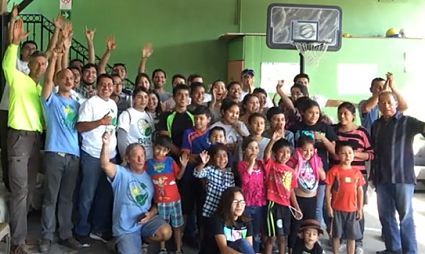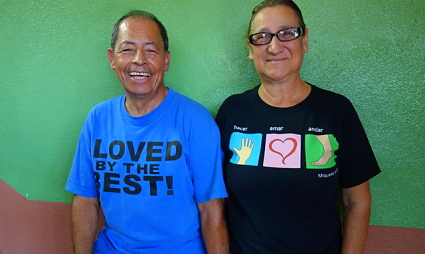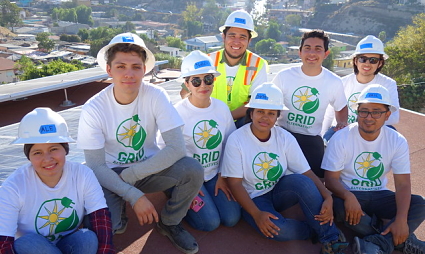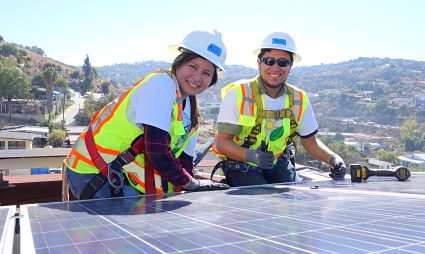Background:
 Casa Hogar Ebenezer is a grid-tied orphanage in Tijuana, Mexico that provides safe accommodations and stability for displaced, orphaned, and abandoned children. Casa Hogar Ebenezer is home to 35 children ages 3-18, founded and run by Pastor Freddie and Eva Duarte, a couple originally from Guatemala. They started the home in 2002 when they were invited to take care of 18 children who had been living at a nearby orphanage that closed.
Casa Hogar Ebenezer is a grid-tied orphanage in Tijuana, Mexico that provides safe accommodations and stability for displaced, orphaned, and abandoned children. Casa Hogar Ebenezer is home to 35 children ages 3-18, founded and run by Pastor Freddie and Eva Duarte, a couple originally from Guatemala. They started the home in 2002 when they were invited to take care of 18 children who had been living at a nearby orphanage that closed.
Daily life at Casa Hogar Ebenezer is very organized from morning to night. The older children teach the younger children how to fold their clothes, do their chores, prepare for school, and do their homework. Every child goes to school during the week and after school all of the kids sit at a long table and do their homework together. After homework, they have dinner and get ready for bed. They kids have access to computers and internet for their homework but they do not watch TV since Eva and Freddie prefer they spend their time doing other activities. However, the kids do enjoy movie nights from time to time. Over the last 17 years a total of 210 parentless children have been part of Casa Hogar Ebenezer. Once the kids turn 18, if they are no longer studying they are not able to live at the home any longer, so Casa Hogar Ebenezer works hard to ensure the kids that are prepared to take care of themselves, be good citizens and good parents once they are on their own.
Casa Hogar Ebenezer is a private non-profit organization, so it does not receive government funding like some orphanages do. Most donations that the home receives are in-kind donations of food, appliances, clothes and toys for the children. The home does not often receive cash donations which makes it very difficult to pay for doctor’s appointments, vehicle repairs, and the high bi-monthly electric bill. Casa Hogar Ebenezer has a high electric bill and uses electricity to power its lights, fans, three washers and one dryer, three refrigerators and a deep freezer, electric heat as needed, and fans to meet the needs of the 35 kids and staff living there.
GRID Alternatives began working with Casa Hogar Ebenezer through our partner organization Corazon de Vida, a non-profit organization with the mission to end child abandonment by breaking the vicious cycle of poverty. Corazon de Vida provides ongoing financial support to Casa Hogar Ebenezer and nine other orphanages in Baja California, and facilitates in-kind donations from other donors. This support ensures the kids have food, clothes, medicine, and supplies, and provides scholarships for kids to attend private school and pursue higher education. GRID was connected to Corazon to Vida through Get Charged Up, a non-profit that supports clean energy, education and the environment.
GRID worked with Casa Hogar Ebenezer to plan for the installation of a solar system on the roof of the center to lower the bi-monthly electric bill. The solar system will reduce the home’s electric bill and take into account the home’s future electric needs.
The Solar Project:
 In October, 2017 GRID Alternatives installed a 10.56kW DC STC photovoltaic system on the roof of the orphanage. GRID staff and volunteers installed the system together with teenagers from the orphanage and 23 students from the Applied Solar Energy Class at Autonomous University of Baja California (UABC) in Tijuana. GRID staff and volunteers installed the solar system over the course of four days with different groups of students gaining hands-on solar installation experience each day. Many university students studying renewable energy in Mexico do not have an opportunity to apply their academic knowledge and learn about safety protocols in the field. The students were women and men from the Tijuana area who hope to pursue careers in renewable energy after graduating from UABC.
In October, 2017 GRID Alternatives installed a 10.56kW DC STC photovoltaic system on the roof of the orphanage. GRID staff and volunteers installed the system together with teenagers from the orphanage and 23 students from the Applied Solar Energy Class at Autonomous University of Baja California (UABC) in Tijuana. GRID staff and volunteers installed the solar system over the course of four days with different groups of students gaining hands-on solar installation experience each day. Many university students studying renewable energy in Mexico do not have an opportunity to apply their academic knowledge and learn about safety protocols in the field. The students were women and men from the Tijuana area who hope to pursue careers in renewable energy after graduating from UABC.
GRID worked with local solar company Sol Energy to procure and import equipment, install the system, and file for interconnection. Non-profit organization Get Charged Up connected GRID to the home, donated the solar modules for the project, and paid for interconnection fees and the transportation of the solar panels. Corazon de Vida played an important role of introducing GRID to the directors of the orphanage and coordinated visits to the home for GRID and its partners. Working with local partner organizations is a key part of GRID’s work to ensure our project are community-centered and sustainable.
There are always unexpected challenges with international work, and this project was no exception. GRID staff discovered one of the buildings had a new roof installed just before the project, which necessitated GRID to act fast and switch from a ballasted racking system to using the Prosolar Solarwedge roof mounting system with roof attachments. The weather conditions were extreme, reaching 102°F on the roof from solar flares and the Santa Ana winds.
It was a binational bilingual team effort and the solar system was officially interconnected two weeks after the installation was complete.
The Results:
 Two years after the project was installed, GRID staff talked with Casa Hogar Ebenezer to see how the solar system was working and to better understand the impacts the system had made so far. The home mentioned the following impacts:
Two years after the project was installed, GRID staff talked with Casa Hogar Ebenezer to see how the solar system was working and to better understand the impacts the system had made so far. The home mentioned the following impacts:
- Before solar, the home was paying an average of $525 for electricity every two months. Now the home pays $21 every two months - a 96% savings.
- With the savings from the solar, the home has built a laundry room and two dorms where volunteer groups can stay when they visit the home. These new spaces will be ready by the end of 2019.
- The older children that live at the orphanage that helped install the solar system are now in charge of maintaining the system. This new responsibility helps builds self-esteem and interest in learning more about renewable energy. These two teenagers, Julio and Victor, also helped GRID install solar at two other orphanages in Tijuana in 2018.
- Before the system was installed Eva and Freddie didn’t have their own room to sleep in; they slept in their office. Now the directors have their own room making the tough job of running the home a bit easier.
- The savings from solar have provided a small financial safety net, making it easier for the orphanage to manage unforeseen circumstances, have more flexibility to send the kids to visits with doctors and specialists, perform regular maintenance on their vehicles, and buy better quality clothes and food for the children. Small expenses are no longer a high stress situation.
- Having solar has allowed Casa Hogar Ebenezer to upgrade all of its light bulbs to LED bulbs, saving even more on electricity each month.
Looking Forward:
Eva and Freddie hope to install an industrial dryer so the kids’ bed sheets can be washed at Casa Hogar Ebenezer in their own laundry room, saving Eva hours of driving time each week. Currently, Eva spends hours and money each week to bring the home’s bed sheets to San Diego to wash them in an industrial washer. Eva and Freddie envision using the additional savings from solar to continue improving the home, to provide food and supplies for the kids, and to have a small savings to pay for unexpected emergencies and events.
System Specs:
- Modules: 33 320W TSM-320PD14 Trina Solar PV Modules
- Inverter: 1 Fronius inverter Symo 10.0-3 208-240
- Racking: Prosolar Solarwedge roof mounting
Total Project Cost: $30,000

View a downloadable PDF of this case study here.
You can see photos from this project here.
To make a donation to GRID Alternatives in support of our work in Mexico please click here.

